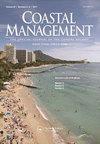Polycentric Governance, Coordination and Capacity: The Case of Sargassum Influxes in the Caribbean
IF 1.9
4区 环境科学与生态学
Q4 ENVIRONMENTAL SCIENCES
引用次数: 8
Abstract
Abstract The merits of polycentric climate governance have attracted considerable discussion. On the one hand, polycentric governance offers an alternative to top-down state-centric forms that have so far proven elusive. On the other, highly networked systems increase coordination challenges. Less attention has been paid to the varying capacities required to achieve coordination. In this article we explore the coordination of polycentric governance via a case study of sargassum influx management in the Caribbean. Since 2011, large quantities of sargassum seaweed have been washing up on Caribbean beaches with adverse socio-economic impacts. Our analysis of sargassum management policies reveals that a nascent polycentric system has generated significant cooperation in policy development and application across the region. However, there remain national capacity deficits to engage in this form of governance and to implement agreed actions. We conclude that advocates of a polycentric climate governance regime need to consider how capacity shapes participation, to the advantage of the largest and strongest. Polycentric governance can be useful for solving disparate cross-border environmental problems, but it also imposes a cost on the smallest that has thus far been unacknowledged and undertheorized.多中心治理、协调和能力:以加勒比马尾藻流入为例
多中心气候治理的优点引起了广泛的讨论。一方面,多中心治理为迄今为止难以捉摸的自上而下的以国家为中心的形式提供了另一种选择。另一方面,高度网络化的系统增加了协调的挑战。对实现协调所需的不同能力的注意较少。在本文中,我们通过对加勒比地区马尾藻流入管理的案例研究来探讨多中心治理的协调。自2011年以来,大量马尾藻被冲上加勒比海滩,对社会经济产生了不利影响。我们对马尾藻管理政策的分析表明,新兴的多中心系统在整个地区的政策制定和应用方面产生了重要的合作。然而,在参与这种形式的治理和执行商定的行动方面,国家能力仍然存在缺陷。我们的结论是,多中心气候治理机制的倡导者需要考虑能力如何影响参与,以最大和最强的优势。多中心治理对于解决不同的跨境环境问题可能是有用的,但它也会对最小的成本施加影响,这一点迄今为止尚未得到承认和理论化。
本文章由计算机程序翻译,如有差异,请以英文原文为准。
求助全文
约1分钟内获得全文
求助全文
来源期刊

Coastal Management
环境科学-环境科学
CiteScore
6.00
自引率
0.00%
发文量
24
审稿时长
>36 weeks
期刊介绍:
Coastal Management is an international peer-reviewed, applied research journal dedicated to exploring the technical, applied ecological, legal, political, social, and policy issues relating to the use of coastal and ocean resources and environments on a global scale. The journal presents timely information on management tools and techniques as well as recent findings from research and analysis that bear directly on management and policy. Findings must be grounded in the current peer reviewed literature and relevant studies. Articles must contain a clear and relevant management component. Preference is given to studies of interest to an international readership, but case studies are accepted if conclusions are derived from acceptable evaluative methods, reference to comparable cases, and related to peer reviewed studies.
 求助内容:
求助内容: 应助结果提醒方式:
应助结果提醒方式:


